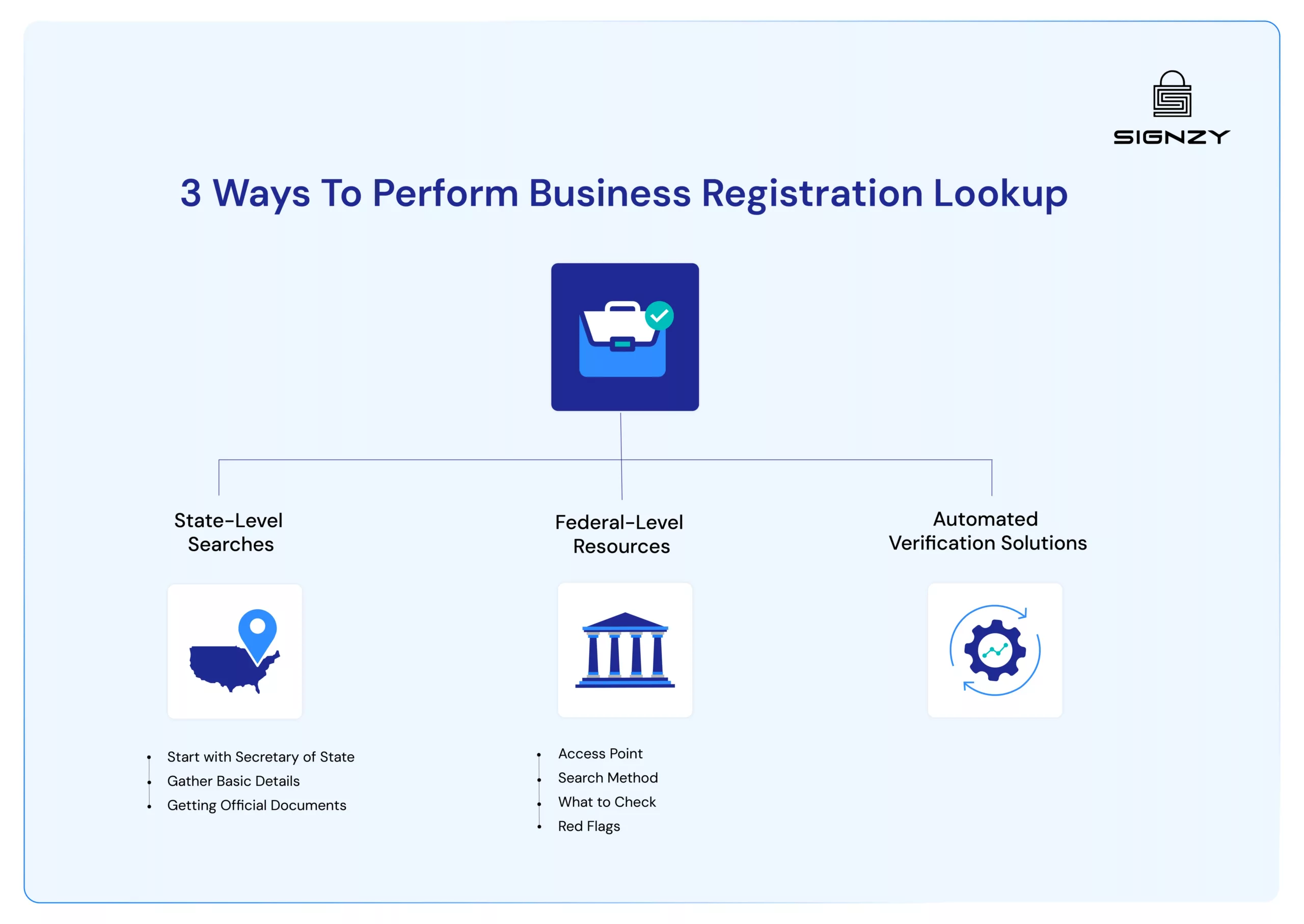- Most businesses miss checking registrations in multiple states, focusing only on their main operating location. A wider search often reveals surprising details.
- State databases aren’t real-time – status updates take 1-2 business days to reflect. What you see isn’t always the latest picture.
- Checking multiple state databases manually can eat up hours. However, there’s a solution – you will get it by the end of this 6-minute guide.
Click. Search. Dead end. Repeat.
Another database. Another portal. Another missing piece.
…Meanwhile, the real data slips right past.
But, guess what? Spending hours searching databases isn’t exactly anyone’s idea of a good time. It shouldn’t feel like searching for a needle in a haystack
3 MINUTES.
That’s how long business verification takes when you know the exact steps (we calculated on a timer).
Even if this 3-minute approach doesn’t work out, this guide covers other time-saving and accurate approaches to verify business registration.
Long story short, this guide gives you everything. Read on to find out how to perform business registration lookup – fast.
💡 Related Blog: How to verify businesses?
Business Registration Lookup, A Quick Definition
Business registration verification acts as a safety net. It’s that reassuring confirmation that yes, this company exists legally and follows the rules. Before trusting another business with money, time, or resources, wouldn’t it make sense to know they’re legitimate?
Small oversights in verification can lead to big problems down the road. That’s why understanding what registration lookup actually shows makes such a difference. Here’s the full picture of what a careful verification lookup reveals:
- Official business name and any “doing business as” (DBA) names
- Current registration status and important dates
- Business structure (LLC, Corporation, Partnership)
- Names and addresses of registered agents
- Complete filing history
When is Business Registration Lookup Required?
Registration verification becomes absolutely essential during several key business moments:
-
When bringing new clients aboard
Those exciting moments of business growth need proper verification. Nothing dampens enthusiasm faster than discovering a potential client isn’t properly registered – after contracts are signed.
-
During vendor selection
Finding the perfect supplier feels great, until registration issues cause supply chain disruptions. Thorough checks prevent those mid-contract surprises that no one wants to deal with.
-
Before signing partnership agreements
Strong partnerships build on trust, and trust starts with verification. Making sure potential partners have their registration in order saves countless future headaches.
-
During compliance reviews
Staying on top of compliance might not be thrilling, but it’s far better than facing penalties. Regular registration checks keep everything running smoothly.
The effects of proper registration verification touch every corner of business operations.
- Finance teams sleep better knowing they’ve verified their clients.
- Supply chain managers rest easier with validated vendors.
- Compliance officers breathe more freely with properly registered partners.
As businesses connect across state lines and borders, quick and reliable registration verification becomes even more crucial.
Modern business moves fast – but moving fast shouldn’t mean skipping important checks.
Finding dependable ways to gather this information matters more than ever. Whether using state resources, federal databases, or modern automated tools, the goal stays the same: getting accurate registration data to support smart business choices.
This gets us to our main section.
3 Ways To Perform Business Registration Lookup
Wondering how to check if a company is legally registered? This section has your answers. Below are the three most reliable ways.
1. State-Level Searches
State-level verification might seem straightforward, but each state maintains its own distinct system. Someone running a simple check on a New York business won’t find it through Delaware’s portal – even if that’s where it’s registered.
If you want to give it a try, here are the exact steps to conduct state-level searches for business registration number lookup.
Step 1 – Start with Secretary of State: Head to the target state’s Secretary of State website. Enter the business name – start with an exact match, then try variations if needed. Some portals offer a “sounds like” option if you’re unsure about spelling. Below are sites of some common business hubs you can use for business registration lookup:
- Virginia State Corporation Commission Business Entity Search
- Rhode Island Secretary of State Business Services Division
- Pennsylvania Department of State Business Entity Search
- New York Department of State Division of Corporations
- Wyoming Secretary of State Business Entity Search
- Washington Secretary of State Business Search
- Division of Revenue & Enterprise Services
- Delaware Division of Corporations
- Florida Division of Corporations
- California Secretary of State
- Illinois Secretary of State
Step 2 – Gather Basic Details: Pull the registration number and status first. Note filing dates and registered agent details. Look for any name changes or DBAs – they often hide in a separate tab called “filing history” or “amendments.”
Step 3 – Getting Official Documents: Download the certificate of good standing if available (some states call it “certificate of status” or “certificate of existence”). Save any annual reports – they show filing consistency. Most states charge $15-25 for official documents.
Well, there’s more. There are some more challenges coming your way. Common state-level challenges include:
- Registration information scattered across multiple states
- Each state’s interface follows different rules (some require exact name matches, others don’t)
- Varying data formats (PDFs in one state, text files in another)
- Historical records that mysteriously disappear after renewal
- Some states charge for basic searches while others offer free access
2. Federal-Level Resources
Sometimes, state searches don’t tell the whole story. Federal databases fill important gaps, especially for larger organizations or those in regulated industries.
Before we get into steps, note some important points.
The SEC’s EDGAR system works well for publicly traded companies but has clear limitations. For private businesses or smaller LLCs, other federal resources become necessary. Federal contractor databases, for instance, help verify businesses claiming government contracts or federal certifications.
IRS business verification adds another layer, particularly useful for tax ID validation and entity type confirmation. But remember – federal resources often provide broader oversight rather than detailed operational data.
Thanks for waiting enough; here are the steps.
To perform business registration lookup from Federal resources, you can follow the steps below depending on the database you are checking.
| Step | SEC EDGAR | SAM.gov | IRS Verification |
| Access Point | SEC.gov/EDGAR – Company Search (no login needed) | SAM.gov – Create free account first | IRS.gov – Tax ID Search (business hours) |
| Search Method | Enter the company name or ticker symbol. Filter by filing types (10-K, 8-K most useful) | Search using exact business name or DUNS number. Check registration status and certifications | Input 9-digit EIN. Match business type and name exactly as registered |
| What to Check | Latest annual reports, major business changes, financial statements. Download key documents for records | Active/inactive status, federal certifications, exclusion records, registration validity dates | Tax ID validity, business type match, current filing status |
| Red Flags | Missing recent filings, frequent amendments, inconsistent business names | Expired registrations, exclusion records, mismatched addresses | Status mismatches, incorrect business types, invalid EINs |
You can run all three checks even if one seems sufficient – each database reveals different aspects of business legitimacy.
3. Automated Verification Solutions
This is the 3-minute way about which we were talking early on.
As the name implies, automated solutions can handle businesses handling registration checks at unimaginable speed – manual checks don’t even stand a chance. Instead of spending hours jumping between state portals, automated systems pull data from multiple sources simultaneously.
These systems typically offer:
- Centralized access to multi-state registration data
- Standardized formats across different jurisdictions
- Regular updates on registration status changes
- Batch processing for multiple verifications
- Integration capabilities with existing business systems
Mechanics and steps differ solution by solution. Below are some most proven automated solutions you can use to conduct business registration lookup – with steps.
Modern Solutions for Registration Lookup
Here’s where things get really practical.
Most of these integrations work right out of the box. No need for complicated technical setups or lengthy training sessions. Teams can usually start running checks within hours of getting access.
The best part? Modern verification solutions can plug right into the following:
- Customer relationship systems (no more switching between programs)
- Contract management platforms (automatic checks before signing)
- Compliance tracking tools (instant alerts if something changes)
This can save a lot of back-and-forth. The section you’ve been waiting for is here.
API Solutions
Think of APIs as digital assistants that do all the heavy lifting. Instead of manually checking each state’s website, these systems talk directly to government databases. Type in a business name once, and the API checks everywhere that matters.
When someone needs to verify a business, the API sends out multiple checks simultaneously. While a manual search might take 30 minutes per state, an API gets results from all states in mere seconds. Better still, it serves up the data in a format that makes sense – no more squinting at scanned PDFs.
Automated Platforms
These platforms build on API capabilities by adding user-friendly interfaces and extra features. Think of them as the business equivalent of a credit check website – but for company verification.
They handle the full verification cycle, from initial checks to ongoing monitoring. When a business’s status changes in any state, these systems catch it immediately. Plus, they keep detailed records of every check, making audit trails a breeze.
You can get started with any of the above solutions right away by finding a reliable solution provider.
Here at Signzy, we understand the verification maze all too well. Our Business Verification and KYC APIs handle everything from basic registration checks to complete identity verification – because sometimes you need more than just business credentials to sleep soundly at night. Looking for a demo to see how it actually works? We’re just a click away.
FAQs
How long does a typical business verification take?
Using modern solutions, basic verification takes 2-3 minutes. Manual searches through state portals might need 20-30 minutes per state.
What if a business is registered in multiple states?
Modern verification platforms check all states simultaneously. They’ll show each registration, status, and any discrepancies between state records.
What are the basic costs of business verification?
State portal searches cost $10-25 per certificate. API solutions typically charge per search (cents per lookup) or offer monthly subscriptions based on volume.
How reliable are automated verification results?
Modern platforms pull directly from official government databases, making them as reliable as manual searches – just faster and more consistent.














